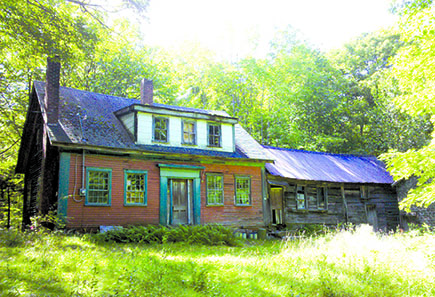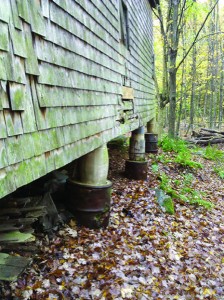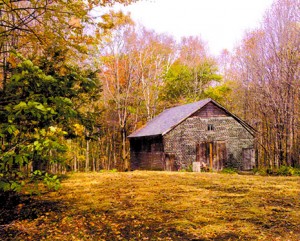
To a ten-year-old boy named Kenny Grant in the 1950s, Andover meant Bradley Lake, the coming of the train at Potter Place, and the Lorden farm at the bend in Bradley Lake Road where it meets Hall Road. He and his parents, summer folks from Baldwin, Long Island, would stop to buy fresh eggs, maple syrup, and wonderful heavy cream, which was as thick as ice cream.
![[[ caption tk from Don Gould ]] Caption: Don Gould. Photo: Charlie Darling](https://andoverbeacon.com/wp-content/uploads/2012/11/s-House-0021-300x199.jpg)
It was always Goldie, Dorothy’s mother, who came to the door when you knocked, since Dorothy was rather shy. It was a thrill for Kenny to see the ponies that were boarded for Camp Marlyn and the ox with the scary horns that used to haul the boulders in the wagon.
Dorothy Lorden was born in Andover on December 13, 1931. As she grew up, she always admired her Aunt Theresa’s farm that was past the Potter Place covered bridge. Her upbringing of living off the land offered her a lifestyle with many values that remained with her. She was born when America was changing, but her family held onto the late 19th century ways.
Two Women And A Farm

In 1957, the young boy Kenny and his dad would see Dorothy’s father, William Lorden, sitting on a chair on the porch. It was only a couple of months later that Dorothy’s father had passed away, leaving the farm to Dorothy and her mother, Goldie. They ran the farm as best as they could after Mr. Lorden’s passing.
When the cows in the pasture needed milking, they would call on their neighbor, Frank Matthews, and he would come and tend to the cows. Kenny used to love to watch Frank milk the cows on his three-legged stool. Once milked, the cows would stroll through her pastures with purpose, guided by the stonewall barricades that ran like a maze on her 100-plus acre property.
The rolling hills of her land were nestled on the slopes above the flood plains of the Blackwater River. The landscape had woodland trails and was cleared in spots, making way for the cornfields, pastures, and amazing views of Ragged and Kearsarge Mountains.
Dorothy’s farmhouse had been built in 1794 by the Langley family. About a hundred years later, the house was purchased by Doctor Rowe, who added onto the original house and was the first to own a car in the area, in the very early 1900s. Dorothy’s father purchased the house from him and commenced farming; true New England “hardscrabble farming.”
Farming was hard for Dorothy and her mother; they had to carry pails of water to replenish the crops. One time a skunk had fallen into the well and poisoned the water. On another occasion her crops were damaged by raccoons and rabbits.

New Hampshire winters were very hard, and Dorothy and Goldie would take turns sitting up at night to be sure that the house didn’t catch fire from the wood-burning stove. In spite of all this adversity, Dorothy had a positive outlook and forged on. Dorothy’s mother Goldie died in the winter of 1977, leaving Dorothy the legacy of the Lorden Homestead.
At one time, the Lordens had a camp on Bradley Lake and a small home in town. Toward the end of her years, Dorothy wanted a vehicle so that she could drive to church and to town. She sent a letter to her brother Bill, who worked at Benson’s Chevrolet. She asked him, “Please send me one blue car.”
Kenny’s Last Visit
Fifty years later, that same 10-year-old boy Kenny returned with his children to her home. It turned out to be his last visit.
Her front door was slightly open, held together by planks and hanging on only one hinge. It was needless to knock, so he just called out, “Dorothy, Dorothy, it’s me, Kenny! I’m here with my two children who have baked a homemade apple pie for you.”
After a couple of minutes, there came a sweet, silver-haired lady in a flannel shirt who replied in a rather shy way, “How wonderful to see you again, and how nice of you and your children to bring this to me.” Kenny left with a heavy heart, knowing how lonely she must have been and feeling it may have been his last visit.
With the passage of time, the home fell into disrepair, and Dorothy’s health began to fail. Donald Gould is a volunteer caregiver and dear friend of Dorothy. He would visit and sit with her as she reminisced about her childhood and told stories about how she loved her home. Don made sure that she would keep her doctor’s appointments and had enough food. He genuinely looked out for Dorothy’s best interests, thus creating a special mutual respect.
When Dorothy was no longer able to care for herself, Don thought it best for her to be placed into the William P. Clough Extended Care Center in New London, where she passed away on February 13, 2012.
Recently, I had the honor of meeting Don at the site of the Lorden property. He was in charge of overseeing the final disposition of her possessions and contents of the house. There were many items in the barn that dated back to the 1800s.
Don was a wealth of information and pointed out to me the beautiful 300-year-old hand-hewn hickory and ash timbers in the house. He told me that they would be repurposed and used to restore a 1800s farm in East Andover on Flaghole Road.
Don showed me the old wagon that Mr. Lorden made that was pulled behind the oxen to transport the rocks and boulders for the stone walls on the property. I picked up an old dusty item in the barn that was the yoke that went across the breast of the animals and was secured to the wagon. It was truly a walk back in time.
Before I left, we walked around the outside of the barn. Don pointed out the foundation that was created with barrels, nail kegs, and old pots filled with cement that were stacked on top of each other. That foundation is still holding up that old barn today.
It was a privilege to meet Don, who so lovingly cared for Dorothy and who handled her past relics with such respect and memory. I left with a sense of profound history and felt special to have had the opportunity to meet Dorothy’s caretaker.
A week later I met up with Don and he gave me a bootjack that came from the property. He had carefully cleaned and oiled it. I will treasure it always, and the meeting of a very special man.
A Letter From Dorothy
In 2008, Dorothy sent my husband Kenny a letter where she thanked him for the gifts he would bring her over the years. Dorothy wrote, “I was surprised to find my favorite meal left on my doorstep by you.” I found it poignant that she mentioned in the letter, “My brother Joe died while I was in the hospital, and I also lost Clancy a few days later. He was at the vet’s, and I never found out what happened to him, but I can guess what they would do with a dog nearly 16 years old.” She went on to write, “I miss him terribly.” I am certain that she would have wanted to bury Clancy on her field as she had done with her other pets. Nonetheless, we will remember him.
We pass her property now with just the barn left, and we imagine that with each dawn her land echoes with the sounds of her past. The sun now shines down upon the graves of her beloved animals. The Lorden homestead was a place where the woods sang with the sounds of birds, chipmunks scurried, the crows would perch upon the old sap house where her maple sugaring was born, and the cowbells resounded through the distant pastures.
We feel Dorothy’s spirit and the land remembers how those years were held together with hard work and love at 172 Bradley Lake Road.